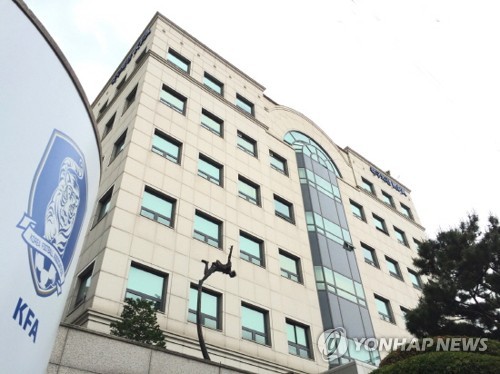- California Assembly OKs highest minimum wage in nation
- S. Korea unveils first graphic cigarette warnings
- US joins with South Korea, Japan in bid to deter North Korea
- LPGA golfer Chun In-gee finally back in action
- S. Korea won’t be top seed in final World Cup qualification round
- US men’s soccer misses 2nd straight Olympics
- US back on track in qualifying with 4-0 win over Guatemala
- High-intensity workout injuries spawn cottage industry
- CDC expands range of Zika mosquitoes into parts of Northeast
- Who knew? ‘The Walking Dead’ is helping families connect
More than 8 bln won unclaimed by S. Korean football academies in training compensation: lawmaker
SEOUL, Oct. 24 (Yonhap) — More than eight billion won (US$7.06 million) in training compensation has been left unclaimed by South Korean football schools and academies in the last five years, a lawmaker said Wednesday, urging the national football governing body to take adequate administrative measures.
According to Rep. Han Sun-kyo of the main opposition Liberty Korea Party, who analyzed data from the Korea Football Association (KFA), South Korean football academies are entitled to 9.1 billion won in training compensation from foreign clubs, but only 500 million won was claimed.
“Our football academies are not getting their payments that are written in FIFA rules,” Han said. “This is not only a loss for schools, but it’s also a loss for our country.”
According to FIFA, training compensation is a financial reimbursement to a player’s training clubs when a player signs his first professional contract. Each time a player is transferred until his 23rd birthday, training compensation needs to be paid to a player’s training clubs.
Han said that local football academies also have rights to receive 8.6 billion won for solidarity payments, but only 600 million won was claimed.
Under FIFA rules, if a professional football player transfers to another club during a contract, up to five percent of the transfer fee shall be distributed to the clubs involved in the player’s training and education.
“Schools need to know the transfer status of their former players overseas, but it’s difficult for them to check, and most of them don’t know how to apply for compensation,” he said. “The KFA should check the transfer situations of South Korean players overseas and notify academies about their training compensation and solidarity contribution status. The KFA should help these football academies in the administration process.”












